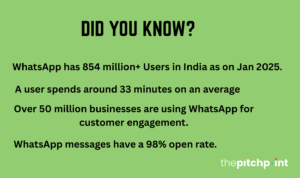Whatsapp Live Chat v. Traditional Chat Support
As customer expectations evolve, so must the way businesses communicate. Traditional website-based chat support has long been the go-to for assisting visitors in real time. It works well within a browser, offering immediate help while users browse your site. However, its limitations—such as session dependency and lack of continuity once the visitor leaves—can create gaps in the support experience.
That’s where WhatsApp live chat is gaining traction. With over 50 million businesses already using WhatsApp to engage customers, it’s clear that this platform is more than just a messaging app—it’s a customer service powerhouse. Unlike traditional chat, WhatsApp allows for persistent, on-the-go conversations in a format users are comfortable with. From multimedia support to mobile-first accessibility, it offers businesses a more seamless and personal way to connect.
In fact, 40% of users have already made purchases through WhatsApp, showing just how influential the platform has become in the customer journey. Let’s explore how WhatsApp live chat compares to traditional chat support and which one better aligns with your business goals.

What is WhatsApp live chat?
WhatsApp live chat is a customer communication tool that lets businesses interact with their audience directly through WhatsApp. With billions of users worldwide, it has become a powerful channel for real-time support, sales inquiries, and customer engagement. This solution allows brands to meet customers where they already are—on their favourite messaging app.
Why use WhatsApp live chat?
- Instant, personalized conversations
Deliver quick, meaningful responses that feel personal and human, helping build customer trust and loyalty. - Rich media support
Share images, documents, videos, and location info to make communication more effective and interactive. - Optimized for mobile
Designed with mobile users in mind, ensuring smooth and responsive chat experiences on smartphones. - Global reach and multilingual support
Connect with customers anywhere in the world and offer assistance in their preferred language with ease.
What is tradition chat support?
Traditional chat support refers to web-based live chat systems typically embedded on a company’s website or app, allowing visitors to chat with customer service agents in real time. Unlike messaging apps like WhatsApp or Messenger, traditional chat support usually requires the customer to stay on the website to maintain the conversation.
Key characteristics of traditional chat support:
- Website-dependent
Customers must remain on the website or app to continue the conversation—once they leave, the chat may end or reset. - No persistent history
Unless the chat is saved or emailed, the conversation history often disappears after the session ends. - Limited to browsers or desktop
While mobile-compatible, it’s primarily designed for web browsers and is less seamless than messaging apps on mobile devices. - One-time sessions
Traditional chat is often session-based, meaning follow-ups require re-initiating the chat or switching to email support. - Often staffed by live agents
Though bots can be used, these chats are usually handled by support agents in real time.
Difference between WhatsApp live chat and traditional chat support
Choosing the right communication channel is crucial for delivering effective customer support. Here’s a quick comparison between WhatsApp live chat and traditional chat support to help you understand their key differences:
| Feature | WhatsApp live chat | Traditional chat support |
| Platform | WhatsApp messaging app | Website or app-based live chat widget |
| User accessibility | Accessible anytime via WhatsApp on mobile or desktop | Only available while user is on the website |
| Chat continuity | Persistent chats saved in the app | Session ends if user navigates away from the site |
| Media sharing | Supports text, images, videos, documents, location | Primarily supports text and limited file types |
| Global reach | Easy international access with multilingual support | Often limited to regional or language- specific setups |
| Notifications | Push notifications via WhatsApp | No alerts once the website is closed |
| Integration with daily use | Integrated with everyday messaging habits | Separate from users’ typical communication channels |
| Customer convenience | High – familiar and mobile-friendly | Moderate – browser-based, less portable |
Benefits of WhatsApp API integration for your business
- Automated customer support
With the WhatsApp API, businesses can automate repetitive tasks like answering common queries and providing information on products or services. By using chatbots and AI-driven systems, you can ensure that customers receive instant support, even when your team is offline. - 24/7 availability
The WhatsApp API enables businesses to provide support around the clock, ensuring that customers can reach out at any time. Whether it’s for urgent inquiries or off-hours questions, your business can be available to respond without needing to hire a large support team. - Scalable communication
Unlike traditional live chat, WhatsApp API can handle thousands of simultaneous conversations, allowing businesses to scale their customer support operations efficiently. Whether your customer base grows or your business runs seasonal campaigns, WhatsApp can easily manage the increased volume. - Rich message format
With the WhatsApp API, you can send not only text messages but also images, videos, audio files, and documents. This rich media capability helps in providing detailed product demos, sending invoices or receipts, and offering a more engaging experience that goes beyond simple text. - Order and delivery updates
WhatsApp API allows businesses to send automated updates to customers about order status, delivery tracking, and even appointment reminders. This helps reduce anxiety about waiting for orders and keeps customers informed at every stage, improving overall satisfaction. - Secure and verified channel
By using WhatsApp Business accounts, companies can add verification badges, ensuring that customers know they’re interacting with an official, trusted entity. The end-to-end encryption on WhatsApp further ensures that sensitive customer data remains protected during interactions. - Global reach with local feel
The WhatsApp API makes it easy to reach customers across the world, regardless of location, and engage them in their preferred language. This localized communication creates a more personalized experience for international customers, helping build loyalty. - Easy CRM and tool integration
WhatsApp API can seamlessly integrate with customer relationship management (CRM) tools and other business software like Shopify, Salesforce, or custom APIs. This integration streamlines processes such as lead management, sales follow-ups, and customer data tracking, improving efficiency. - Improved customer engagement
WhatsApp’s conversational nature promotes two-way communication, allowing businesses to engage customers on a deeper level. By providing real-time responses and personalized interactions, businesses can foster stronger relationships with their customers, leading to higher engagement and loyalty. - Data insights and reporting
The WhatsApp API provides valuable insights into customer interactions, such as message delivery rates, read receipts, and response times. This data helps businesses analyze customer behavior, improve messaging strategies, and measure the effectiveness of their communication efforts.
End note
Customer expectations are no longer confined to desktop screens and business hours. In a world where instant messaging is part of everyday life, the way businesses communicate must evolve too. While traditional chat support still holds value for real-time help during website visits, it lacks the flexibility and continuity today’s customers expect.
WhatsApp live chat, on the other hand, offers a more dynamic and mobile-first experience—enabling businesses to stay connected even after the customer leaves the website. From automated replies and multimedia support to 24/7 accessibility, it empowers brands to deliver fast, personalized, and scalable customer service.
Ultimately, choosing between WhatsApp and traditional chat depends on how and where your customers prefer to interact. But if your goal is to stay ahead in a mobile-driven market, adopting WhatsApp live chat could be the competitive edge your business needs.
Ready to transform your customer experience?
Contact Thepitchpoint today to integrate WhatsApp live chat into your business and engage your customers where they’re most active.

